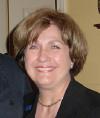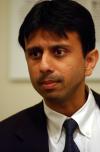|
Issue Date: November 7, 2003 Two pro-life Catholics court evangelicals in La. governor's race By JASON BERRY In 1991 the media invaded Louisiana for a gubernatorial runoff between former Ku Klux Klan leader David Duke, and Edwin Edwards, a former governor tainted by allegations of corruption. Edwards courted black ministers while Duke promoted himself as a pro-life Christian to evangelical leaders. Duke’s history as a neo-Nazi incensed Jews. The campaign was marked by religious fervor as much as politics. A bumper sticker said it all: “Vote for the Crook. It’s important.” Such are the eccentricities of Louisiana politics. The media is not invading in such great numbers this year, even though, just as the Duke run provided a window into ugly prejudices that still pulse through the national body, the current race provides a new measure of the effect of religion (particularly Catholicism) in politics and may even reveal new limits to old racism. In ’91, Edwards won 61 percent of the vote with an enormous black turn-out. Duke received a majority of the white vote and the support of many born-again Christians. Today both men are in federal prison. Edwards, 74, left office in 1995, and was convicted of extorting money from casinos in his final term. He is serving a 10-year term. Duke, 53, was a marginal figure when he took a plea bargain last spring and began an 18-month sentence for mail fraud -- bilking white supremacists to support a habit at the crap tables.
This year the racial polarization is evaporating with a brown-skinned Asian-American, 32-year old Republican Bobby Jindal, in a close race with Democratic Lt. Gov. Kathleen Blanco, 60, in the runoff for the Nov. 15 election. Both candidates are Catholic. Both are pro-life (though Blanco would support the exceptions for rape, incest and to save a mother’s life). Jindal grew up in Baton Rouge, the son of Hindu immigrants from India. He became a convert as an undergraduate at Brown University. He studied politics, graduated with honors and went to Oxford as a Rhodes scholar. He was 24 when Gov. Mike Foster appointed him secretary of the Department of Health and Hospitals, which under Edwards had become plagued by deficits and cronyism. Jindal turned the department around. He later went to Washington in the current Bush administration as a health policy adviser. He resigned to run for governor.
With a convert’s zeal, Jindal entered into a covenant marriage, which under state law is harder to dissolve by divorce. His wife of five years, Supriya, is also a convert. They have a daughter, 1, and a second child on the way. “People of faith should not be required to separate their faith from their daily lives, their professions, or from public discourse,” Jindal has said. “The public square must always be faith-friendly, and the religious liberty our forefathers so highly valued must always be protected.” Jindal has emulated the Bush administration in calling for faith-based offices under the governor’s auspices, a faith community advisory council and grants to church groups providing certain services. Jindal advocates “aggressively promoting adoption as an alternative to abortion and closely regulating abortion providers.” He entered the first primary, in which candidates for all parties compete, with the support of Foster, the outgoing governor, and led with 32 percent of the vote. Elections here are traditionally won in the southern half of the state, which encompasses New Orleans, Baton Rouge and Acadiana, or Cajun country. In this broad area roughly a third of the voters are Catholic, and just as many are African-American. Louisiana has a larger concentration of Catholics than any other Deep Southern state and is the only one with two Democratic senators -- John Breaux and Mary Landrieu, both of whom are Catholic. Kathleen and Raymond Blanco are a pair of charming careerists who have raised six children in a devout home. Amid the adrenalin rush of politics they have reversed the stereotype of a woman-behind-the-great man theory. They attend Mass together and even shoot ducks together. Kathleen Babineaux grew up in a large family in the port of New Iberia. She was just out of University of Southwestern Louisiana in nearby Lafayette when she married Raymond in 1964, at the time a football coach at Catholic High in New Iberia. By the mid-’70s they had six children. As “Coach” Blanco moved up the ladder at the university in Lafayette to dean of men, and eventually vice-president for student affairs, they ran a polling business out of their home. She did research analysis, sometimes getting the kids to assist her in toting numbers, asking questions herself in telephone surveys for candidates and businesses. In 1979 she became district manager for the 1980 census. She had to hire 1,200 census-takers; she made TV spots to find them. One day in a restaurant, a lady told her she should run for office. “I learned a lot about people in those years,” she said in a recent interview. “You can get a real sense of what matters in people’s lives if you ask questions and know how to listen. In this election I keep saying that if enough people are committed to change we can make it happen.” In 1983, when she announced her candidacy for a seat in the legislature, “my stomach nearly dropped out,” said her husband. She made the runoff against the wife of the richest man in Lafayette, who spent $300,000. “Kathleen spent $22,000,” said Raymond. “She just gutted it out. Went house to house and won 60-40.” When the legislature was in session, Kathleen made the 60-mile commute to Baton Rouge and returned home for dinner. In 1991 she won a seat on the three-person Public Service Commission, which oversees the regulation of public utilities. In 1995 she was elected lieutenant governor, an office that markets culture and tourism. Blanco touts 21,000 tourism jobs created on her watch and a $400 million increase in tourism last year. “There are two faces of Louisiana,” she has said in speeches. “One is beautiful, creative and energetic. And then there’s the other side with undereducated people and an underdeveloped economy.” For years Blanco courted evangelical Christians just as she did black organizations, building a coalition that few Democrats could envision. She won her second term as lieutenant governor with a whopping 965,000 votes. Jindal’s evangelical Christian agenda has cut into Blanco’s support. With an endorsement from the New Orleans Times-Picayune, Jindal led the primary with 32 percent. Blanco had 19 percent, followed closely by two more liberal Democrats, whose supporters would seem naturally drawn to her. Jindal is the more articulate candidate, rattling off numbers and programs for various policy initiatives. As the race entered the final week, Jindal had the support of a black group in New Orleans -- where 62 percent of voters are African-American -- although it is rare for a black group to endorse a Republican. Jindal is unlikely to draw more than 8 percent of the African-American vote across the state. Blacks represent 29 percent of Louisiana voters. Their turnout is pivotal for any Democrat in a statewide race. Last year’s huge black turnout for Landrieu was a repudiation of President Bush, who made a campaign swing for her opponent. Perhaps worried about such a backlash, Jindal has not made plans for an appearance by Bush. Hence the double-irony: A brown-skinned man needs a low turnout of blacks in order to win. Blanco, alternatively, must find a way to galvanize black voters. “Pigmentation-wise, Jindal is colored,” said Lawrence Powell, a Tulane University historian and the author of Troubled Memory, a book on the 1991 election. “But color is a social construction. In the eyes of whites, he’s a white person. It is kind of ironic that someone who is darker skinned than the last two mayors of New Orleans elicits strong support in North Louisiana among conservative whites. Race to them is something very specific: African-Americans. And people who are brown, or yellow, and outside of the black community, apparently don’t fall into the category.” The well-spoken Jindal has dazzled many professionals who seem willing to overlook his fundamentalist agenda. On the other hand, “Blanco has been underrated so long it works to her advantage,” says pollster Ed Renwick, a political scientist at Loyola University of New Orleans. Jason Berry is a Louisiana-based freelance reporter. National Catholic Reporter, November 7, 2003 |

